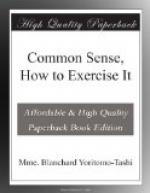It is in these terms that Yoritomo initiates us into what he calls the mechanism of common sense; in other words, the art of acquiring by the simplest reasoning this quality dull as iron, but, like it, also solid and durable.
LESSON IX
COMMON SENSE AND ACTION
These qualities are two relatives very near of kin; but, just for this reason, they must not be confounded.
While common sense is applied to all the circumstances of life, practical sense is applicable to useful things.
Common sense admits a very subtle logic which is, at times, a little complex.
Practical sense reasons, starting from one point only; viz., material conveniences.
It is possible for this sense to be spoiled by egotism, if common sense does not come to its assistance.
It is by applying the discipline of reasoning to practical sense that it modifies simple sense perception by urging it to ally itself with logic, which unites thought to sentiment and reason.
“The association of common sense and practical sense is necessary,” says Yoritomo, “in order to produce new forms, at the same time restraining the imagination within the limits of the most exact deductions and of the most impartial judgment.”
Science is, in reality, a sort of common sense to which the rules of reasoning are applied, and is supported by arguments which practical sense directs into productive channels.
That which is called great common sense is none other than a quality with which people are endowed who show great mental equilibrium whenever it is a question of resolving material problems.
These people are generally country people or persons of humble position, whose physical organism has been developed without paying much attention to their intellectual education; they are, in fact, perfect candidates for the attainment of common sense, without having been educated to this end.
Their aptitude results from a constant habit of reflection which, rendering their attention very keen, has permitted them to observe the most minute details, therefore they can form correct conclusions, when it is a question of things that are familiar to them.
A peasant who has been taught by nature will be more skilled in prophesying about the weather than others.
He will also know how to assign a limit to the daily working hours, at the same time stating the maximum time which one can give without developing repulsion, which follows excesses of all kinds.
In his thought, very simple, but very direct, will be formulated this perfect reasoning:
Health is the first of all blessings, since without it we are incapable of appreciating the other joys of life.
If I compromise this possession I shall be insensible to all others.
It is, therefore, indispensable that I should measure my efforts, for, admitting that a certain exaggerated labor brings me a fortune, I shall not know how to enjoy it if illness accompanies it.




